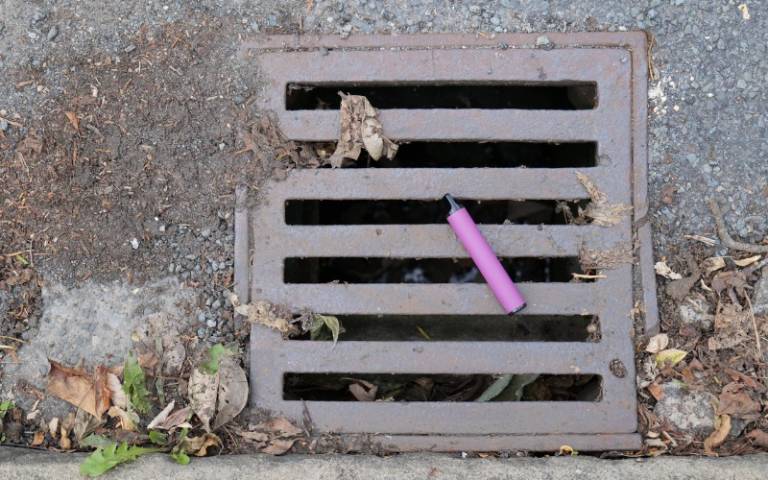Worldwide action to halt the environmental threats posed by single-use electronic devices such as e-cigarettes is urgently needed, according to a group including researchers from UCL.

Writing in the journal Science, researchers from across the UK have highlighted how disposable vape sales quadrupled in the country between 2022 and 2023, with consumers now throwing away around five million devices each week.
In the United States, over four disposable vapes are thrown away each second, and it is fast becoming an issue replicated across the world.
One of the main issues is that vapes and other disposable technologies, including mini-fans and single-use headphones, often contain valuable resources such as lithium and other rare earth elements.
These elements are increasingly being seen as critical for green industries such as electric vehicles, but their use in existing devices has significantly diminished their global availability.
While these technologies are marketed as recyclable, they are often sold without clear recycling instructions and offer minimal incentives to consumers to return the valuable materials once they have finished with them.
To address this, the researchers have called for urgent reform of disposable electronics practices in the technology industry, to avoid continued resource depletion and environmental degradation.
They have also said the premise of disposal electronics and other single-use items should be questioned at its core, and that such products "may be too dangerous in the long term to justify keeping them on the market".
Professor Mark Miodownik, an author of the letter from UCL Mechanical Engineering, said: "The publishing of our letter shows the importance of banning disposable vapes to protect the environment. We recognise that banning products that give millions of people pleasure might seem anti-business. But the companies involved have not acted responsibly. Indeed, what is becoming very clear is that disposability itself is not compatible with a healthy planet."
The letter has been authored by experts in environmental science, materials science, marine biology, consumer behaviour and ethics from UCL, Abertay University, the University of Dundee and the University of Plymouth.
Their call comes as world leaders are meeting in Ottawa, Canada, for the fourth session of the Intergovernmental Negotiating Committee (INC-4) convened to negotiate an international and legally binding Global Plastics Treaty.
It also follows recent legislation introduced in countries including the UK and Australia to limit the availability of disposable vapes, as part of a wider drive to reduce the impact of smoking and electronic alternatives.
The letter's lead author Laura Young, a PhD researcher at Abertay University and the University of Dundee, said: "Right now, we have a narrow and rapidly closing window of opportunity to address the e-waste crisis. Throwaway electronics have entered the mainstream, the prime example being the rise and prevalence of disposable vapes. These small electronic devices promote the casual disposability of precious Earth materials and the creation of excessive amounts of e-waste. Legislative action, most notably the UK Government's commitment to ban disposable vapes, begins to address this, however action beyond a product-by-product, country-by-country approach is required. Therefore, we must now leverage past successes in waste reduction on a global scale, to tackle this crisis before it consumes us."






